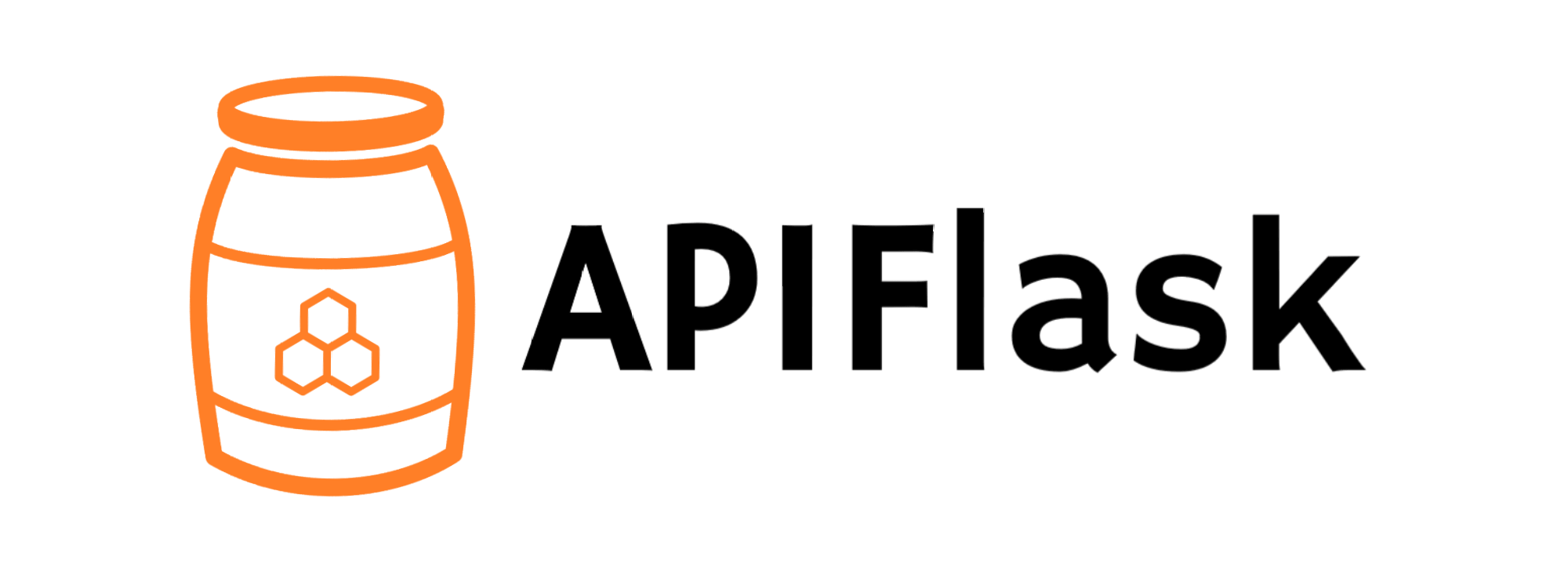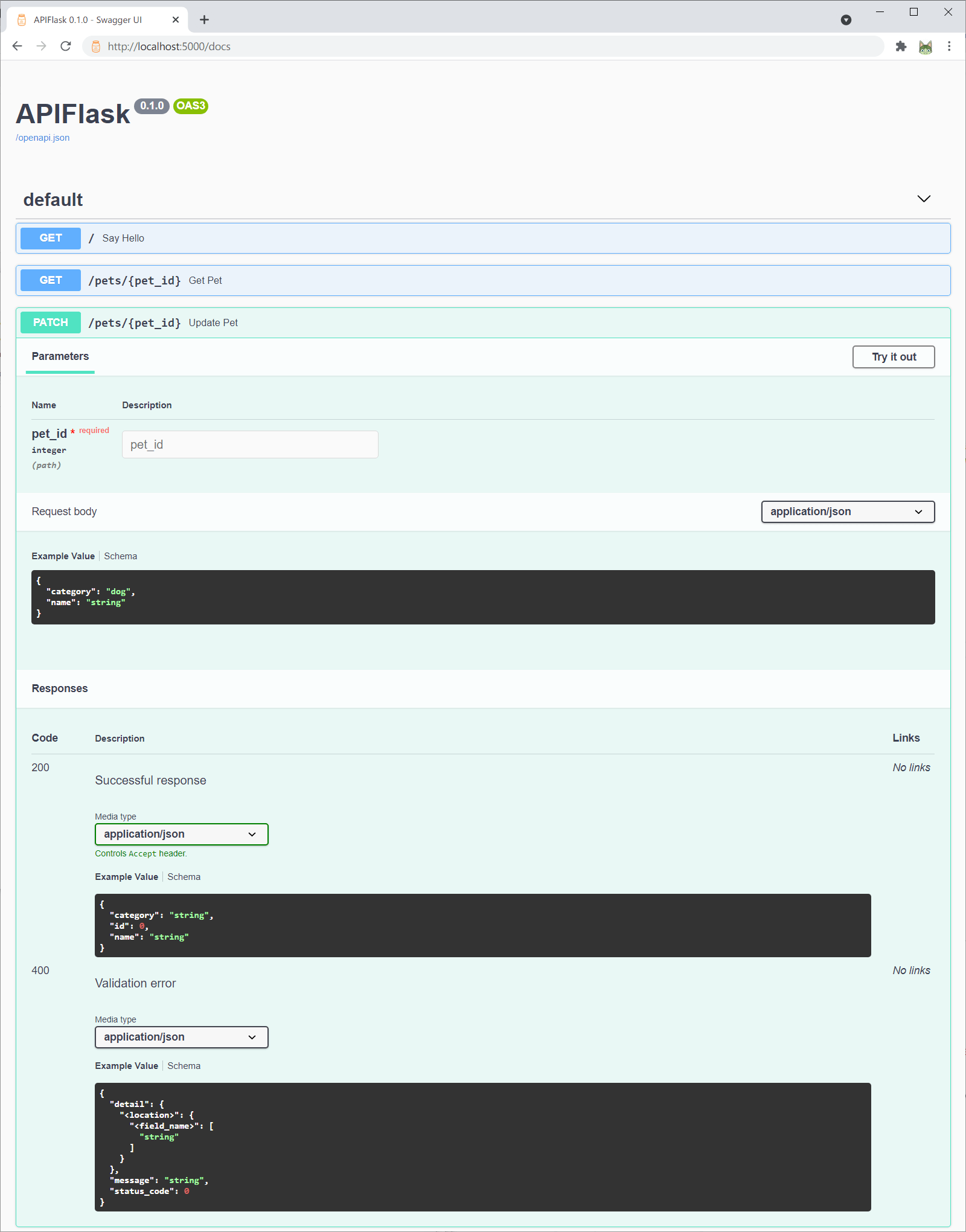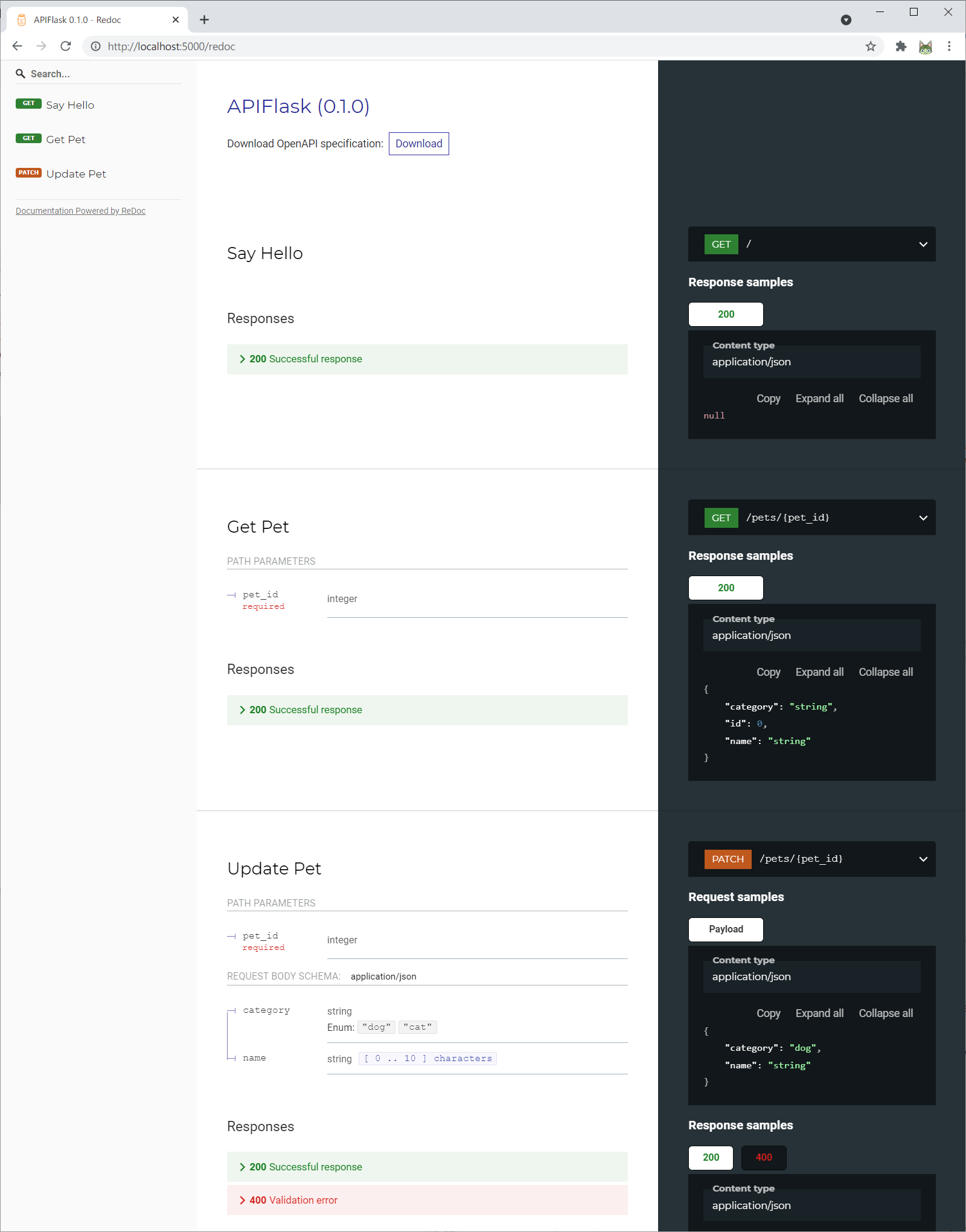A lightweight web API framework based on Flask and marshmallow-code projects.
Project description
APIFlask
APIFlask is a lightweight Python web API framework based on Flask and marshmallow-code projects. It's easy to use, highly customizable, ORM/ODM-agnostic, and 100% compatible with the Flask ecosystem. It starts as a fork of APIFairy and is inspired by flask-smorest and FastAPI (see Comparison and Motivations for the comparison between these projects).
With APIFlask, you will have:
- More sugars for view function (
@input(),@output(),@app.get(),@app.post()and more) - Automatic request validation and deserialization (with Webargs)
- Automatic response formatting and serialization (with Marshmallow)
- Automatic OpenAPI Specification (OAS, formerly Swagger Specification) document generation (with APISpec)
- Automatic interactive API documentation (with Swagger UI and Redoc)
- API authentication support (with Flask-HTTPAuth)
- Automatic JSON response for HTTP errors
Currently this project is in active development stage, bugs and breaking changes are expected. Welcome to leave any suggestions or feedbacks in this issue or just submit a pull request to improve it. Thank you!
Requirements
- Python 3.7+
- Flask 1.1.0+
Installation
For Linux and macOS:
$ pip3 install apiflask
For Windows:
> pip install apiflask
Links
- Website: https://apiflask.com
- Documentation: https://apiflask.com/docs
- PyPI Releases: https://pypi-hypernode.com/pypi/APIFlask
- Change Log: https://apiflask.com/changelog
- Source Code: https://github.com/greyli/apiflask
- Issue Tracker: https://github.com/greyli/apiflask/issues
- Discussion: https://github.com/greyli/apiflask/discussions
- Twitter: https://twitter.com/apiflask
- Donate on Open Collective: https://opencollective.com/apiflask
Example
from apiflask import APIFlask, Schema, input, output, abort
from apiflask.fields import Integer, String
from apiflask.validators import Length, OneOf
app = APIFlask(__name__)
pets = [
{
'id': 0,
'name': 'Kitty',
'category': 'cat'
},
{
'id': 1,
'name': 'Coco',
'category': 'dog'
}
]
class PetInSchema(Schema):
name = String(required=True, validate=Length(0, 10))
category = String(required=True, validate=OneOf(['dog', 'cat']))
class PetOutSchema(Schema):
id = Integer()
name = String()
category = String()
@app.get('/')
def say_hello():
# returning a dict equals to use jsonify()
return {'message': 'Hello!'}
@app.get('/pets/<int:pet_id>')
@output(PetOutSchema)
def get_pet(pet_id):
if pet_id > len(pets) - 1:
abort(404)
# you can also return an ORM/ODM model class instance directly
return pets[pet_id]
@app.put('/pets/<int:pet_id>')
@input(PetInSchema)
@output(PetOutSchema)
def update_pet(pet_id, data):
# the parsed input data (dict) will be injected into the view function
if pet_id > len(pets) - 1:
abort(404)
data['id'] = pet_id
pets[pet_id] = data
return pets[pet_id]
Click to see the same example with class-based views.
from apiflask import APIFlask, Schema, input, output, abort
from apiflask.fields import Integer, String
from apiflask.validators import Length, OneOf
from flask.views import MethodView
app = APIFlask(__name__)
pets = [
{
'id': 0,
'name': 'Kitty',
'category': 'cat'
},
{
'id': 1,
'name': 'Coco',
'category': 'dog'
}
]
class PetInSchema(Schema):
name = String(required=True, validate=Length(0, 10))
category = String(required=True, validate=OneOf(['dog', 'cat']))
class PetOutSchema(Schema):
id = Integer()
name = String()
category = String()
# use the "route" decorator to decorate the view class
@app.route('/')
class Hello(MethodView):
# use HTTP method name as class method name
def get(self):
return {'message': 'Hello!'}
@app.route('/pets/<int:pet_id>')
class Pet(MethodView):
@output(PetOutSchema)
def get(self, pet_id):
if pet_id > len(pets) - 1:
abort(404)
return pets[pet_id]
@input(PetInSchema)
@output(PetOutSchema)
def put(self, pet_id, data):
if pet_id > len(pets) - 1:
abort(404)
data['id'] = pet_id
pets[pet_id] = data
return pets[pet_id]
Save the file as app.py, then run it with:
$ flask run
Now visit the interactive API documentation (Swagger UI) at http://localhost:5000/docs:
Or you can visit the alternative API documentation (Redoc) at http://localhost:5000/redoc:
The auto-generated OpenAPI spec file is available at http://localhost:5000/openapi.json.
For a more complete example, see /examples.
Relationship with Flask
APIFlask is a thin wrapper on top of Flask, you only need to remember four differences (see Migrating from Flask for more details):
- When creating an application instance, use
APIFlaskinstead ofFlask. - When creating a blueprint instance, use
APIBlueprintinstead ofBlueprint. - The
abort()function from APIFlask (apiflask.abort) returns JSON error response. - The view class should be registered with the
routedecorator.
For a minimal Flask application:
from flask import Flask, request, escape
app = Flask(__name__)
@app.route('/')
def hello():
name = request.args.get('name', 'Human')
return f'Hello, {escape(name)}'
Now change to APIFlask:
from apiflask import APIFlask # step one
from flask import request, escape
app = APIFlask(__name__) # step two
@app.route('/')
def hello():
name = request.args.get('name', 'Human')
return f'Hello, {escape(name)}'
In a word, to make Web API development in Flask more easily, APIFlask provides APIFlask and APIBlueprint to extend Flask's Flask and Blueprint objects, and it also ships with some helpful utilities. Other than that, you are actually using Flask.
Project details
Release history Release notifications | RSS feed
Download files
Download the file for your platform. If you're not sure which to choose, learn more about installing packages.
Source Distribution
Built Distribution
File details
Details for the file APIFlask-0.5.1.tar.gz.
File metadata
- Download URL: APIFlask-0.5.1.tar.gz
- Upload date:
- Size: 56.8 kB
- Tags: Source
- Uploaded using Trusted Publishing? No
- Uploaded via: twine/3.3.0 pkginfo/1.5.0.1 requests/2.25.1 setuptools/41.2.0 requests-toolbelt/0.9.1 tqdm/4.55.1 CPython/3.8.0
File hashes
| Algorithm | Hash digest | |
|---|---|---|
| SHA256 | 7b6d7d9536901b7c124f0e0c940699921a0d8b05dd5c73fd749a4ada6c6a7ef4 |
|
| MD5 | 85d215ff44d39ac47be4d28cddad19b8 |
|
| BLAKE2b-256 | 4483de1201b6d0b88a74419a4e39c11ba6de424a6870f3539f1bbf30b1050ec6 |
Provenance
File details
Details for the file APIFlask-0.5.1-py3-none-any.whl.
File metadata
- Download URL: APIFlask-0.5.1-py3-none-any.whl
- Upload date:
- Size: 40.5 kB
- Tags: Python 3
- Uploaded using Trusted Publishing? No
- Uploaded via: twine/3.3.0 pkginfo/1.5.0.1 requests/2.25.1 setuptools/41.2.0 requests-toolbelt/0.9.1 tqdm/4.55.1 CPython/3.8.0
File hashes
| Algorithm | Hash digest | |
|---|---|---|
| SHA256 | bbbb6a7f320e1296b1fbf70ab1a25023f2d18aae705f0b5fbe4d97f1fdbed986 |
|
| MD5 | 8f15caa650530715ec213ac53c6c7ac3 |
|
| BLAKE2b-256 | 3d6eaea769712497b4eec8ec402d82aafa9d8a1e0293c5dd1d5348e59912b37c |

















